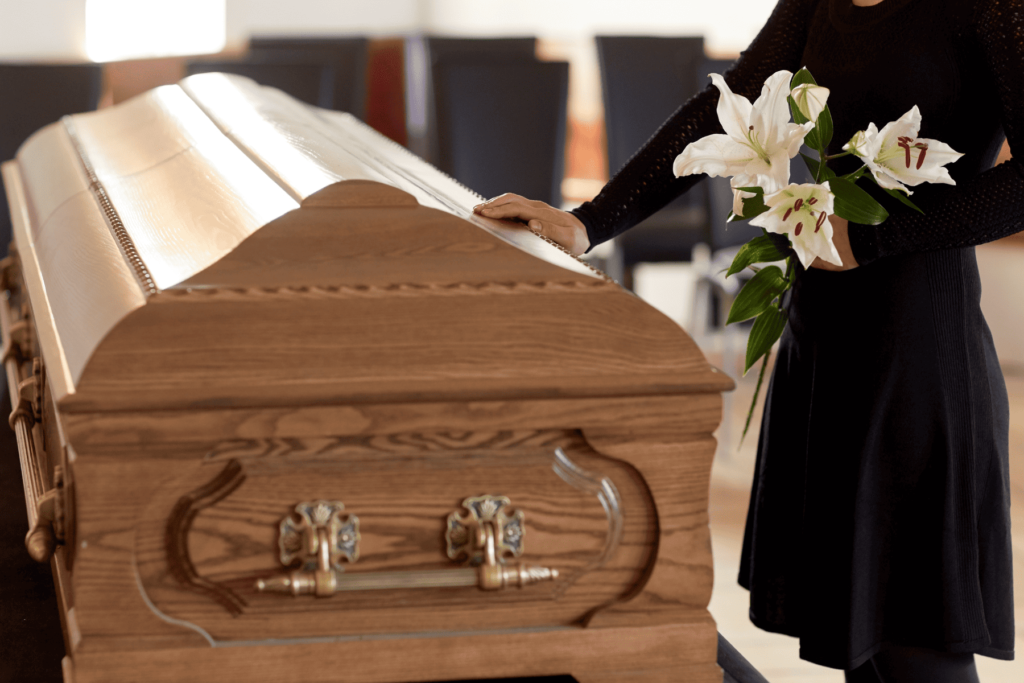
When a loved one passes away, one of the first decisions to make when arranging a funeral service in the UK is deciding who will conduct the service. There are plenty of options to choose from, whether you want a traditional religious ceremony led by a vicar or priest, or a more personalised secular celebration of life led by a humanist or civil celebrant.
At Joseph A. Hey & Son, our experienced funeral directors are often asked – can anyone conduct a funeral service? Or does it have to be an officiant with formal religious authority to perform funerals? The answer is that there is a fair amount of flexibility in the UK. Family members can conduct DIY funerals if they wish, or you can select from various qualified professionals depending on the type of service you want.
Here we’ll explore the main options for who can officiate and lead funeral services in the Bradford area and throughout Britain:
Religious Leaders Such as Priests and Vicars
For traditional religious funerals involving customs and rituals aligned to a specific faith, the service is usually conducted by an ordained minister such as:
- Vicar or priest (for Church of England Christian funerals)
- Officiating monk or nun (for Catholic funerals)
- An imam (for Islamic funeral prayers)
- A rabbi (to lead Jewish mourning rituals)
- A Hindu priest (called a pujari) to perform Hindu funeral rites
- A pastor for Baptist or evangelical Christian ceremonies
- Other religious officiants depending on the belief system
These religious leaders have the formal authority, training and responsibility to conduct services in keeping with the relevant religious doctrines, sacred texts and traditions to guide the soul into the afterlife.
They can lead traditional aspects like scripture readings, hymns/songs, eulogies, rituals and prayers aligned to that faith. As part of their clergy duties, they can also provide pre and post-funeral spiritual counselling to grieving families.
Secular Celebrants for Personalised Non-Religious Funeral Services
For families who want a more individual and informal funeral ceremony focused on commemorating the deceased’s life rather than religious themes about the afterlife, secular celebrants provide an alternative. The most common options are:
Civil Funeral Celebrants
Civil celebrants are officiants who specialise in creating bespoke non-religious funeral ceremonies that reflect the personality, passions and relationships of the person who died.
Legally, anyone in Britain can conduct funeral services. But civil celebrants undertake formal training and get certification showing funeral-specific expertise in:
- Consulting with families to plan personalised ceremonies
- Writing and delivering eulogies capturing the spirit of the deceased
- Devising creative ceremonies with special touches like releasing doves, balloon lifts, planting trees etc.
- Providing ongoing bereavement support after the funeral
So civil celebrants combine knowledge of the legalities plus creative skills tailored for funerals. Families appreciate their flexibility to conduct funerals reflecting the individual without conforming to any doctrine.
Humanist Celebrants
Humanist celebrants are similar to civil celebrants in providing non-religious funerals focused on the deceased and comforting loved ones. However, they adhere to Humanist philosophical principles oriented around ethics, reason and focusing on human welfare in this life instead of the afterlife.
Humanist celebrants complete formal training and certification in:
- Humanist values/principles
- Leading personalised secular ceremonies
- Public speaking and presentation skills
- Bereavement counselling
They excel at researching the deceased’s personality and life to create meaningful eulogies and ceremonies celebrating their memory. Their training also equips them to sensitively help families deal with grief.
Family Members or Friends Conducting the Funeral
In Britain, there are no legal impediments preventing family members or friends from conducting DIY funeral services themselves if they wish. However, speaking confidently in public and running a smooth event requires skill and composure. It may be wise to have a professional celebrant or officiant assist with planning and delivery.
If determined to arrange everything without assistance, consider:
- Does the venue allow the public to conduct services there? Check policies.
- Planning the order of service, timing, readings, music, eulogy delivery etc
- Having others deliver readings so one person doesn’t have to do everything
- Practicing speaking slowly and clearly in front of an audience
- Having water and notes handy in case emotions overwhelm you
An officiant can guide families wanting more involvement through options like allowing them to share eulogies or selecting special readings.
How Joseph A. Hey & Son Can Help You Arrange the Right Funeral Service
Here at Joseph A. Hey & Son funeral directors, our experienced staff have supported Bradford area families for over a century through all facets of funeral planning and bereavement support. We are happy to discuss options with you for finding the most suitable celebrant or officiant to conduct your loved one’s funeral service in line with their wishes and your needs.
Whether you prefer a traditional religious ceremony or more informal personal celebration of life, we can connect you with the right officiant for the occasion. We can also advise you on how to plan a special order of service, venue selection and all other aspects of arranging a funeral to honour your loved one.
For dedicated guidance on any funeral arrangements, please call Joseph A. Hey & Son today at 01274 571021. We are always ready to listen and help your family create a meaningful, comforting service.